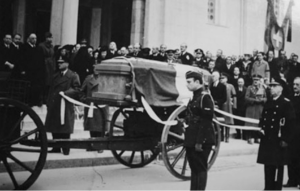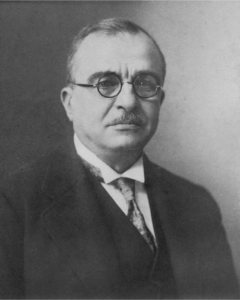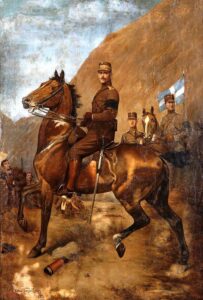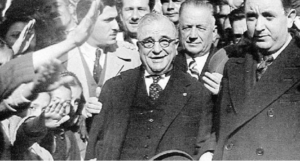
The Man Who Said No
As is emblematic of Balkan countries, when the Greek Prime Minister and head of the Fourth of August Regime, Ioannis Metaxas, died of septicemia from a throat abscess on 29 January 1940 there were whispers of a dark conspiracy of assassination.

The whispers seemed to converge on the arrival of a British medic who hooked the Prime Minister up to a canister of oxygen while he was on his deathbed and then packed up the oxygen and left when Metaxas expired.
As the specter of World War II loomed over Greece’s borders, very few people believed that a change in leadership was in Greece’s best interests, and the conspiracy theories about Metaxas’s death were highly unlikely to be true.

Metaxas’s family was minor nobility, a fact of which Metaxas was very proud. Starting out his career in the military, he came to the attention of Crown Prince Constantine, who sponsored him for further military study in Germany.

Caught up in the National Schism era of Greek government, Metaxas bounced back and forth in exile until he finally fully resigned his military commission in 1920 and entered politics. He followed his exit from the military by founding his own political party, the Freethinkers Party in 1922, which was followed by another period of exile.
When he did return, the Freethinkers Party managed to take more than 15% of the vote in the 1926 elections. The party itself was regarded as the most extreme of the royalist factions, and Metaxas was known for being openly hostile to parliamentary government.
Metaxas’s political moment in the limelight came 4 August 1936 when the looming threat of an imminent strike and continuing labor unrest gave Metaxas an excuse to declare a state of emergency against a “communist threat”.
“[I will hold] all the power I need for saving Greece from the catastrophes which threaten her,” Metaxas said.
The Fourth of August Regime began running – parliament was adjourned indefinitely and civil liberties were suspended. Media was censored, political parties were banned, strikes were prohibited, and even certain forms of music were banned.

The ultimate goal of Metaxas’s regime was to bring back the traditional Greek values of ancient Greece and the Byzantine Empire. To this end he organized a youth organization called the National Organization of Youth, which emphasized discipline and physical fitness in boys and the virtues of being a wife and mother to girls. The Asfaleia, the political police, arrested and jailed more than 15,000 people with some torture taking place. However, the Fourth of August Regime was distinguished from other fascist regimes because they didn’t make extensive use of political murder or instate the death penalty, with dissidents usually being banished to Aegean islands.
Although Metaxas and his regime never enjoyed broad support, some of the policies he instituted enjoyed immense popularity: unemployment insurance was created, as was maternity leave for women and a five day/40 hour work week. Metaxas’s policies also stabilized the drachma and saw initial economic success with per capita income rising and a decline in the rate of unemployment.
But Metaxas’s career pinnacle, the moment that turned him from an unpopular Prime Minister to a national hero, occurred on 28 October 1940.
The Greeks had been trying to preserve a modicum of neutrality in the face of Italian encroachments and increasing demands from both the Germans and British. Neutrality ended when the Italian Ambassador delivered a demand from that several strategic Greek sites be turned over to them. Metaxas did not hesitate, and using French as the language of diplomacy responded, “Alors, c’est la guerre,” (Then it is war).
The story heard by the Greek public, however, was that Metaxas responded with a simple, “OXI!” (NO). The Greek population poured into the streets shouting “Oxi!” in a mass demonstration of national unity.
The Greeks turned this resolve into a victory in the following Greco-Italian War, but the tides would turn in April 1941 when the Germans got involved and invaded.
Ioannis Metaxas would not live to see that moment.
For more information about Greek history, please click here.
- January 29, 2021
- History , Interesting
